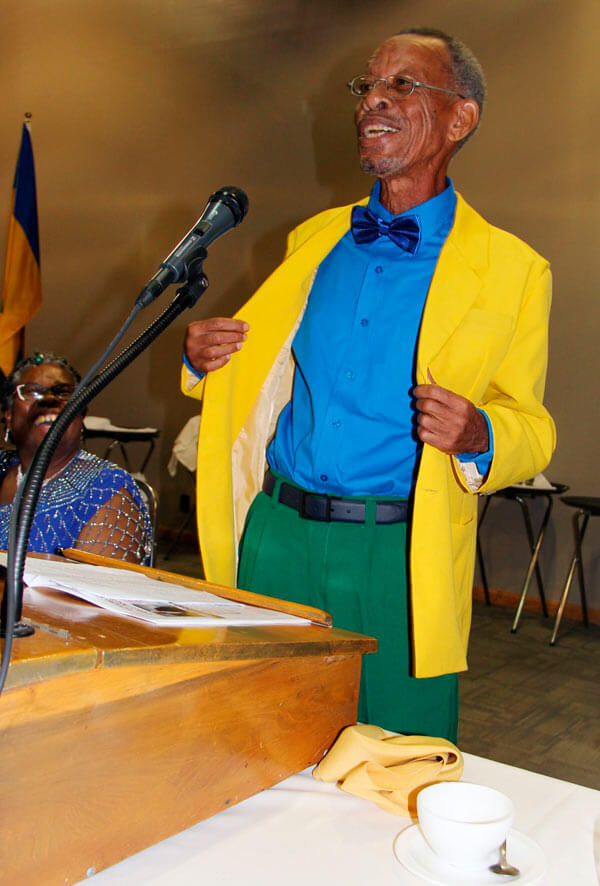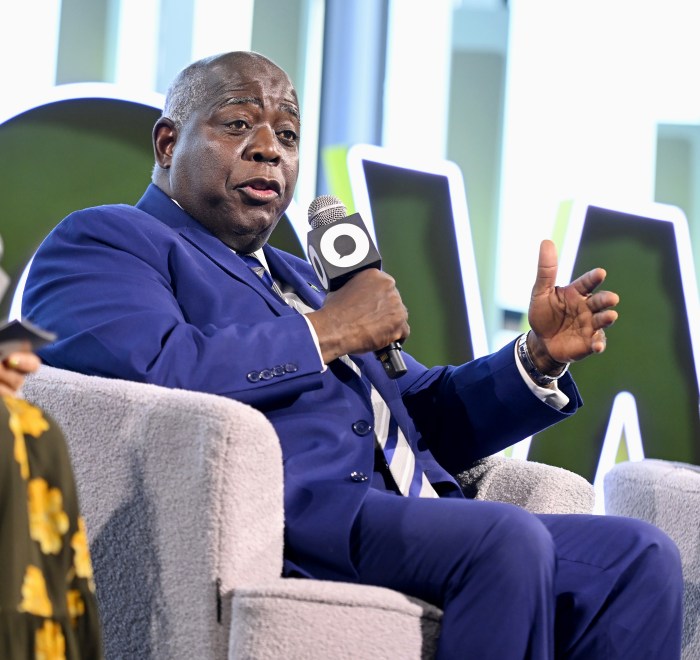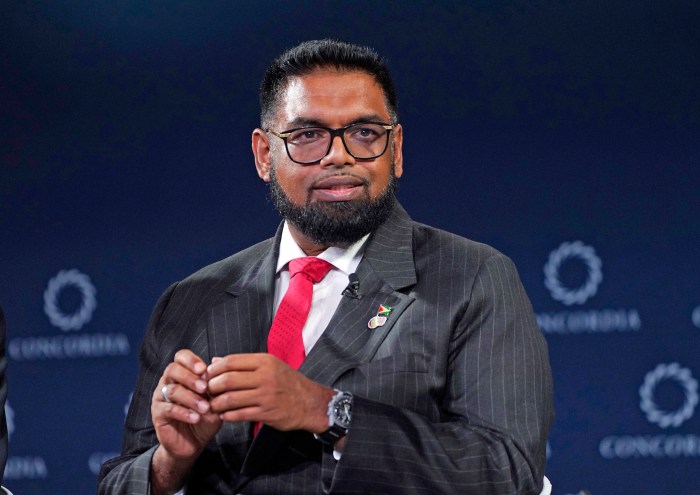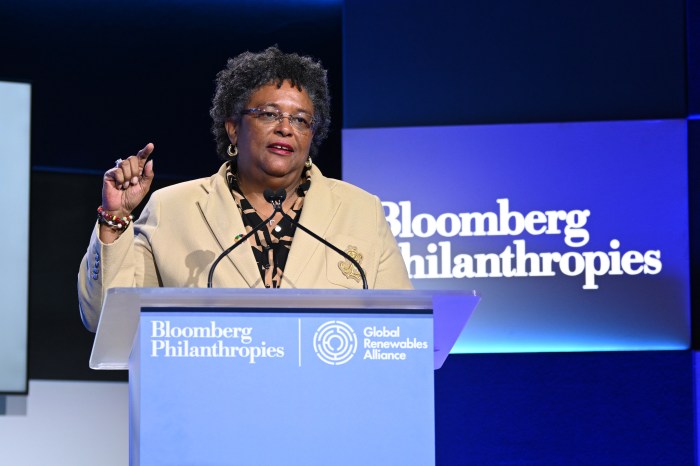Stating that 1971 is a “good start-off point” for his broadcasting “journey,” popular Vincentian broadcaster Ferrand “Randy D” Dopwell Saturday night recollected his vast experience, thanking nationals in Philadelphia for being part of that expedition.
In delivering the keynote address at the gala Independence Dinner Dance and Awards ceremony, commemorating the 38th independence anniversary of St. Vincent and the Grenadines, by the Philadelphia-based St. Vincent and the Grenadines Organization of Pennsylvania, Inc. (SVGOP), Dopwell said, in 1971, he migrated from St. Vincent and the Grenadines to New York, with the sole aim of attending business school.
While attending New York Business School, he said all he knew about radio, at that time, was “the fascination that a man can be somewhere in the world, and you can listen to what he is saying, via radio.
“I knew about Bob Connell and Frank Rojas, Weston Lewis, Jerry Romain,” he told his rapt audience at Penns Landing Caterers on the Philadelphia waterfront. “There was Dave Elcock in Trinidad. I was more interested in soccer in and out of school.
“In [St. Vincent] Grammar School [his alma mater], though, you had to be in more than one club,” added Dopwell, who received a proclamation from the Council of the City of Philadelphia, through Councilwoman Jannie L. Blackwell. “So, I joined the Educational Tour Club — where I got to know [honoree Judge] Emille Cox a bit better, and became his stand-up on stage. I stood there, and he made jokes. That was the beginning of my on-stage experience. Thanks, Emille.”
While attending business school, Dopwell said he worked part time with several businesses, as a means of taking care of his living expenses – “the part time job that really made a difference in this journey is working at the Edison Parking at Lincoln centre — New York’s Centre for the Performing Arts, Metropolitan Opera Theatre, Julliard School of Music, The Alice Tully Hall, The Philharmonic Hall — where I had a back stage pass to all the great shows: Duke Ellington, Ray Charles and Stevie Wonder to name a few; and Frankie Crocker, ‘The East Coast Rocker,’ was one of the MC’s [Master of Ceremonies].
“I was now listening to WLIB, WBLS, WWRL — the Black radio stations. There was Eddie O’Jay the morning announcer on WLIB — he was my favourite,” he continued.
Dopwell said he also liked to “admire vehicles,” adding that “there were lots to watch at the parking lot.
He said “a white gentleman caught me watching his Mercedes and asked me if I loved her. Here is how I met Mr. Monserrat.
“That was his name when he introduced himself,” Dopwell said. “I replied, ‘we’ve an island in the Caribbean named Montserrat.’”
He said Monserrat inquired what he was pursuing, but told him that, besides business, he was “interested in broadcasting.
“He said, ‘great, I’m a producer at ABC TV and can get you in as an apprentice if you go to RCA School for a six-month course,’” Dopwell said. “$2,000 was a lot of money. In trying to raise that money, it got me into radio today — 1973 – 2017.”
But, unfortunately, Dopwell said he was unable to raise the money and had to forego that opportunity.
But while communicating with his big brother, Dove Liverpool, who was just graduating from Humber College in Canada, Dopwell said Liverpool “provided another opportunity” for him to attend Humber College, “and I jumped in.”
Dopwell said he spent three years in Humber College’s broadcasting program, where he “learnt a lot” and interned at top Canadian radio stations.
He said the most memorable was CFTR, the #2 station in Toronto, with the #1 radio personality — Duke Roberts.
“Yes, I learnt from the best,” Dopwell said. “I learnt white radio and built Caribbean radio around what I had learnt. I also worked with the best. I met Brian Joslyn at Pindoff Records, while applying for a part-time position.”
He said Joslyn, who had moved from Capitol Records to the smaller company to learn the retailing of records, offered him a position. Before taking up the offer, Dopwell said he returned home to St. Vincent and the Grenadines in the summer of ’74 and created “Snap Soul” on the steps of the St. Vincent Grammar School in capital Kingstown.
He said he then returned to Canada in 1975 and worked part time with Joslyn at Capitol, where he remained for 1 ½ years until he graduated.
In that stint, Dopwell said he had complimentary passes to see “some of the greatest acts of the day” — Bob Marley and the Wailers, Chicago, Gladys Knights and the Pips, and BB King.
In touching on pre- and post-independence radio in St. Vincent and the Grenadines, during stages in his “journey,” Dopwell told patrons that, “when the story is written about Caribbean radio, Randy D might not be mentioned, but whatever is mentioned you need to know that Radio 705 in St. Vincent and the Grenadines was at the forefront of the change.”
He said that happened during the pre-independence stage, when, in 1977, Radio 705 increased its watts to 10, 000, “and Randy D showed up.
“We only had one radio station at the time, and jobs in that field ware hard to get,” he said. “So, you had to be creative.”
He said Vincy Carnival had just changed from the pre-Lenten season to June — July, and he was asked to be the chairman of the Pre-Carnival Shows by the then chairman of carnival, Molly Arthur.
“This is how I got on radio and became known as ‘Randy D — The Caribbean Music Recipe,’” Dopwell said, adding that “outside broadcasting” enabled him to gain “a great listening audience in the region.”
In the 1980s, Dopwell said he collaborated with radio announcer Earl “Capp” Stevens on “Disco Connection,” where the two of them promoted a lot of the local music; some we recorded helping to take Vincy Mas to higher heights.
In 1989, Dopwell said he migrated again to Canada, but, instead of radio, he I moved into television, producing “Vibes Caribbean” for two years on Rogers Cable Station.
Subsequently, he moved to Philadelphia, where he linked with Lennox Holigan and Pedro Gun, and explored “the possibility of purchasing some radio time.
“In and between time, I sat-in with guys at WKDU, Terry on WRTI,” he said, adding that “Jah-T was the man running Caribbean Radio in those days. “We acquired radio time at a Spanish radio station in the north-east — Cheltenham.”
Dopwell said the manager, at first, told him that he did not have any available time but quickly changed his mind on learning that he was from St. Vincent and the Grenadines.
“He responded that he was from Panama, and his grandmother was from St. Vincent [and the Grenadines]; and that was the first time he was meeting anyone from St. Vincent [and the Grenadines],” Dopwell said.
“So, Philly [Philadelphia], you’re a major part of this journey — just like I feel a part of the St. Vincent and the Grenadines Organization of Pennsylvania,” he said, adding that he made “a few more stops on this journey on the American market.”
He said WNJR in Newark, New Jersey, for 3 ½ years, was “a major stop,” before he returned to St. Vincent and the Grenadines to “set-up the programming for the first FM station — HITZ FM.” HITZ FM linked with WLIB on Friday mornings, becoming “the most listened to link-out of the islands,” Dopwell said.
“The 90’s saw an emergence of FM stations in St. Vincent and the Grenadines, and the question may be asked, ‘was all these stations a benefit to SVG [St. Vincent and the Grenadines] in its post-independence stage?’” he asked. “And how would it be compared to the pre-independence stage when there was only one radio station?
“Food for thought I would say, but this would require in-depth research to answer these questions,” he added. “I can say, though, that the additional stations have provided job opportunities in the industry and also a platform for talk-radio — be it good or bad.”
Dopwell said his “journey” continues on Saturday mornings on NICE Radio in St. Vincent and the Grenadines, adding that since popular comedian Lucien “Sir Luce” Small, died, he has become the nightrider on NICE Radio on Thursdays, 10:30 pm – 2 am.
He said “Vibes Caribbean” is now seasonal, broadcast during Christmas and Vincy Mas.
























